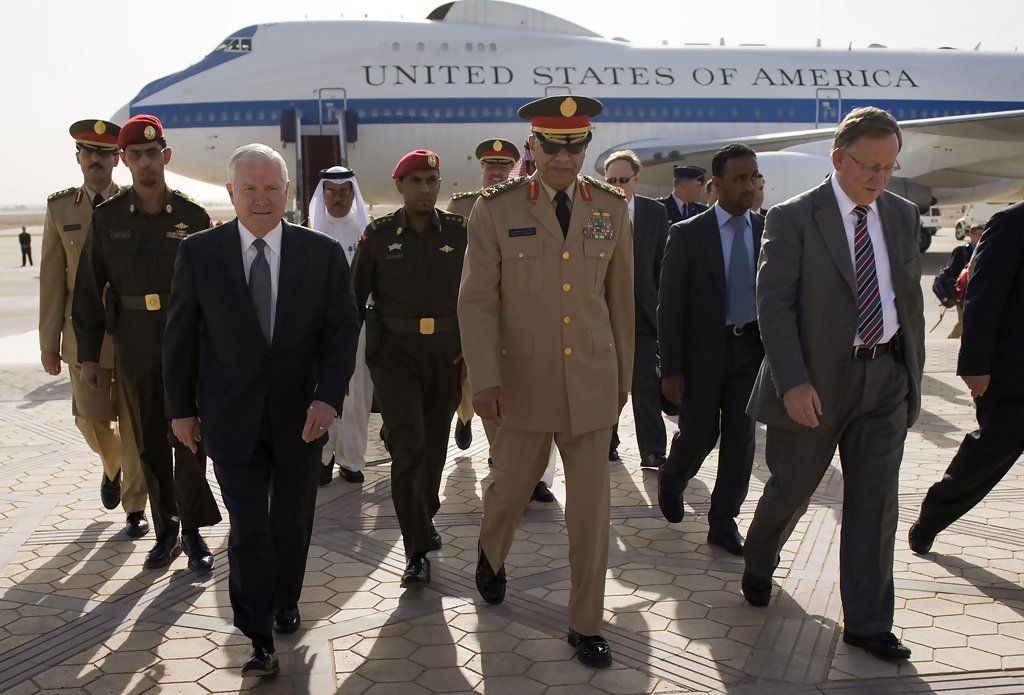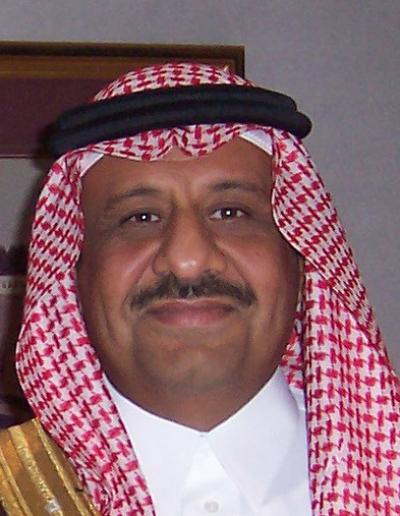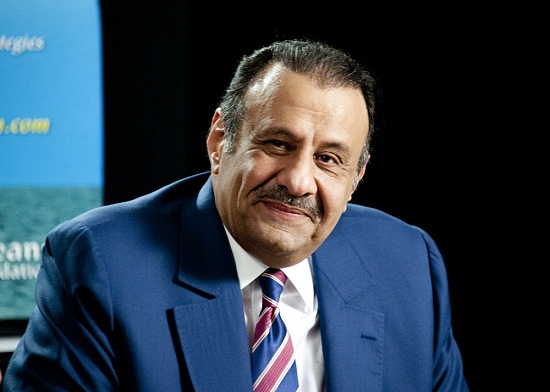<Back to Index>
- General of the Saudi Arabian Army Saleh Al-Muhaya, 1939
- Commander of the Joint Forces Field Marshal Khalid bin Sultan, 1949
PAGE SPONSOR

Field Marshal Saleh Al-Muhaya (Arabic: صالح المحيا), was the former Chief of the General Staff of the Saudi Arabian Army and the Vice Commander of the Saudi Armed Forces. Beside the Field Marshal Prince Khalid bin Sultan, Al-Muhaya led the Saudi Arabian Army in the Gulf War with the Allied Forces. He later commanded Saudi Forces during the Sa'dah insurgency in Yemen before retiring in 2011.
- Born in Ar Rass in 1939.
- Graduate high school arts section.
- Graduated from King Abdul Aziz Military Academy on 1957.
- Held a session of Staff of the Command and Staff College from Britain, a similar course (staff) of the Command and Staff College in Saudi Arabia and the War Staff of China; also took a number of military courses.
- From 1975 the commander of Madrspaldvaa air.
- From 1979 Director of the Office of the Chief of General Staff.
- From 1982, Director of Planning and Budget.
- From 1989, the commander of the eastern region.
- From 1992 the commander of ground forces.
- From 1997 to 2011 the commander of the General Staff.


Khaled bin Sultan (Arabic: خالد بن سلطان بن عبد العزيز آل سعود) (born 14 September 1949) was the deputy minister of Defense and a member of the House of Saud.
Prince Khalid was born on 14 September 1949. He was the eldest son of the late Prince Sultan and full brother of Fahd bin Sultan, Faisal bin Sultan and Turki bin Sultan. Their mother is Moneera bint Abdul Aziz bin Mousad al Saud. She died in Paris in August 2011. Moneera bint Abdulaziz was sister of Alanoud, spouse of King Fahd. She was also cousin of King Khalid and Prince Muhammed.
Khalid bin Sultan is a graduate of King Saud University. He then attended the Royal Military Academy Sandhurst and the U.S. Army's Command and General Staff College at Fort Leavenworth in Kansas. He graduated from the Air War College at Maxwell Air Force Base in Alabama.
In his first years as a soldier, despite his choice to be selected for Special Forces personnel, Khalid bin Sultan was given a command of an artillery platoon in Tabuk. Later, his position advanced as he was given a task for conducting contract and purchasing of Saudi Arabia's first guided missile with People's Republic of China. For this prominent role, he was given an honorary title "Father of Saudi Arabia's Missile".
After years in the Army, thinking that air defense should be given more important role in the national defense, he established the Saudi Air Defense Force, and became its first commander. Shortly after occupation by Iraq of Kuwait in the first Persian Gulf War, he was chosen as Commander of the Joint Forces, and shared a nominally equal position and responsibility with General Norman Schwarzkopf of U.S. Army. King Fahd promoted him to Field Marshal afterward. In 1991, he retired from the military to focus on business. In January 2001, he was brought back into military as Assistant Defense Minister of Military Affairs.
In early 2011, he announced that “more than 70 percent of military equipment can be produced locally" and the future creation of a government branch for domestic military growth. He was regarded as a likely candidate to replace his deceased father as Defense Minister. He was criticized for his "weak military credentials".
His favorite adage is: "He who are not willing to climb the mountain,
will spent the time in the bottom of the cliff". During his military
tenure, he always carried the inscription on his desk until his
retirement. He always thought that his best military position was not as
a
commander in the Gulf War, but as a small artillery platoon leader in
his first assignment. He also thought that his ascend had nothing to do
with his association with the House of Saud but was merit-based.
In November 2009, Khalid bin Sultan led a Saudi military intervention in Yemen. The campaign was plagued by various tactical mistakes and Khalid was heavily criticized. The Saudis had 130 casualties and Yemen lost over 1000.
In December 2009, Khalid gave a 48 hour ultimatum for Houthi withdrawal from Al-Jabri. Soon, he declared that the campaign had ended after the Houthi promised through Al-Quds Al-Arabi they would withdraw from the border in exchange for a cease fire. The Houthi also stated that the Yemen government had used Saudi territory to bomb targets.
In February 2010, Ambassador Smith met with Khalid. Smith brought attention to Saudi air strikes on Yemeni hospitals. Khalid admitted that the event occurred because Yemen had designated the area as a Houthi military base. He also stated that this event occurred because of inaccurate military equipment and the U.S. refusal to provide Predators. He went on to state that Saudi strategy was to force the Houthis to reconcile with the Yemeni government by a strong show of military force. He complained that it was difficult to avoid civilian casualties. The Saudi - Yemeni joint committee granted clearances to Khalid bin Sultan for attacks to be conducted. He complained that Yemeni intelligence was unreliable and politically motivated. Yemen data claimed terrorist positions in a place when in actuality the place was the office of General Ali Mohsen Al Ahmar, a political adversary to President Saleh.
It is reported that King Abdullah was not pleased by Khalid's leadership. King Abdullah specifically expressed his concerns over the long duration of the conflict, large number of casualties, and Saudi incompetence. Therefore, this situation led to decrease in his potential potential as successor of his father as Defense Minister.
In September 2000, Khalid founded The Living Oceans Foundation in the USA.
Khalid was the chairman for the committee of the Prince Sultan bin Abdul-Aziz International Prize for Water. He was chair of board of trustees of Sultan bin Abdulaziz al Saud Foundation. He was also a member of the board of trustees of the Arab Thought Foundation that is a Saudi think tank group, attempting to improve the relations between Arab nations and the Western nations.
He owned the newspaper Al-Hayat. It is said that he did not interfere in its publishing as long as no royal criticism was published (!!!).
In the late 1990s, Khalid expressed an interesting opinion concerning the Turkish - Arab relations. For him, Arabs should ask themselves what brought about this crisis. After criticizing Arab politics for an inability to "cope with rapid changes on the ground," he stated how they "assumed Turkey would be on their side forever, even if it gained no benefit thereby." The Arab side, on the other hand, "did not comprehend the complexities of the internal situation in Turkey, or that country's regional and international considerations. This created a climate that could push Turkey ever further into the camp of unfriendly countries." Finally, he proposed improving Turkish - Arab ties "[s]olely by granting supreme importance to mutual economic interests. It is vital to find a form of economic integration between the Arabs and Turks, even if it is a gradual process." And he proposed Turkish - Arab cultural collaboration, calling on Arabs and Turks to "start purging history books and textbooks of mutual insults." He also supported military cooperation between Turkey, Pakistan, and the Gulf states.
Khalid firstly married King Fahd's daughter, Lulua. They divorced in 1978. They have three children. Their first child, Reema died when she was four months old. His other children from his first marriage are Faisal (born 1973) and Sara (born 1976). Later, he married another full uncle's daughter, Abeer bint Turki bin Abdulaziz. They have five children: Hala, Fahd, Salman, Mishail and Abdullah.
One of his daughters married King Abdullah's son, Turki bin Abdullah who is a pilot in the Royal Saudi Air Force on 13 January 2010.
He published a chatty and insightful memoir about his life, entitled Desert Warrior, that revealed many secrets about the first Gulf War — such as the fact that Israel alerted its nuclear armed missile forces after Iraq started firing Scuds at Tel Aviv both to warn the Iraqis not to use chemical warheads and to press Washington to do more to hunt Scuds in western Iraq.